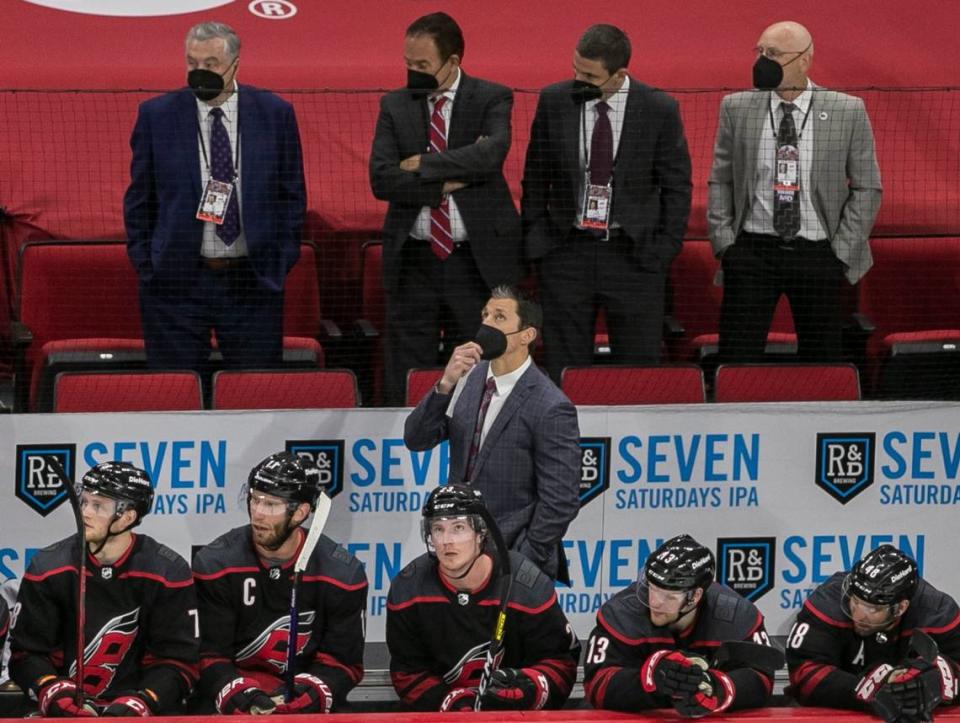Was it the right call? The Canes overcame a goal called back for goalie interference
- Oops!Something went wrong.Please try again later.
- Oops!Something went wrong.Please try again later.
- Oops!Something went wrong.Please try again later.
RALEIGH -- A penalty for interfering with the goalie used to be as simple as blue and white: Hit the keeper in his protected net-front area to influence a goal being scored, you get a penalty.
Tuesday in Game 5 against the Predators, the Hurricanes thought they’d tied the game at the 12:22 mark of the second period when the puck ping-ponged through a gaggle of players in front of Preds keeper Juuse Saros and into the back of the net.
Jordan Staal, who’d last touched the puck, led the celebration. Warren Foegele joined him, in unison with 12,000 white-towel waving, chest-thumping, red-and-black-clad partisans at PNC Arena.
Then, trepidation. For the first time all season, Nashville coach John Hynes challenged the play on the grounds of goaltender interference.
You read that right: Hynes hadn’t challenged a play for goaltender interference all season.
But he did on Tuesday.
A close look at the replay shows Foegele backing toward Saros at the top of the blue paint. The two made incidental contact, well before the puck started its circuitous path through the enclave. Preds defender Roman Josi boxed Foegele out, but in doing so, backed into his own goalie, further inhibiting his ability to see -- and react to -- the bounding puck.
Josi had a far greater impact on Saros’ inability to see or stop the goal. But NHL officials -- and not those in the building, this went further up than that -- saw it differently.
“Carolina’s Warren Foegele impaired Juuse Saros’s ability to play his position in the crease prior to Jordan Staal’s goal,” the NHL said.
The Canes’ faithful, having seen multiple angles of the same replay on the big screens in the arena, buzzed with confidence before the announcement.
They were irate in its aftermath. For the balance of the second period, at every whistle, a chorus of boos seamlessly followed each whistle.
While it’s fair to be irate because the team had a crucial, possibly series-defining goal disallowed, is there a good case that the call was wrong?
Here is the passage from the NHL rule book of Rule 69.1: “The goaltender interference rule is based on the premise that an attacking player is interfering with the ability of the goalie to make a save. Goals will only be disallowed if an attacking player, either by his positioning or by making contact with the goalie, interferes with the goalie’s ability to freely move in the crease/defend the goal, or a player initiates deliberate contact with the goaltender, within in the crease or out of it.”
In its interpretation, the NHL is weighing the ability to move in the crease more heavily than the spirit of the rule appears to imply. While Foegele only briefly backed into the crease, he did in fact make contact with Saros, inhibiting the goaltender’s ability to freely move in the crease.
But, Foegele’s apparent effect on Saros had little to do with the puck bounding off bodies in front and finding the back of the net, and certainly no more than Josi, who could have danced the tango with Saros across the blue paint.
That’s what Brind’Amour saw, too.
“I get why they called goalie interference,” Brind’Amour said. “(Foegele) was there initially. Had that shot come in initially, I think it’s goalie interference. But it didn’t come initially. So then, he gets out and their guy clearly pushes him and interferes with the goalie. It’s not our guy. There’s no chance he’s making that save anyway. It’s going wide, hits our skate and goes in.”
To be fair, it’s irked a lot of people across the league, most of whom don’t cry foul at a single play specifically, rather an apparent inconsistency in the way the rule is applied.
“There needs to be a little more common sense on that, in my opinion,” Brind’Amour continued. “That’s clearly their guy preventing the goalie from making the save, not our guy ... I got a different explanation, but it is what it is.”
None of that helped the Hurricanes in the moment, nor did it help the 12,000 strong (and thousands more watching on TV) who booed their disapproval at every whistle, and held their breath at every future Carolina rush.
Martin Necas’ second goal of the night at 12:55 of the third period ensured the goal reversal wouldn’t factor as heavily into the final outcome, but instead of a go-ahead tally, it simply forced a third consecutive overtime between the teams.
The Canes, despite the setback in the second frame, now have two chances to close out the Predators, beginning Thursday with Game 6 in Nashville, thanks to a goal from Staal in overtime that did count.
While the Canes’ ability to finish the opening series in these Stanley Cup playoffs doesn’t hinge on a single play, the balance of Game 5 on Tuesday certainly felt like it did.



